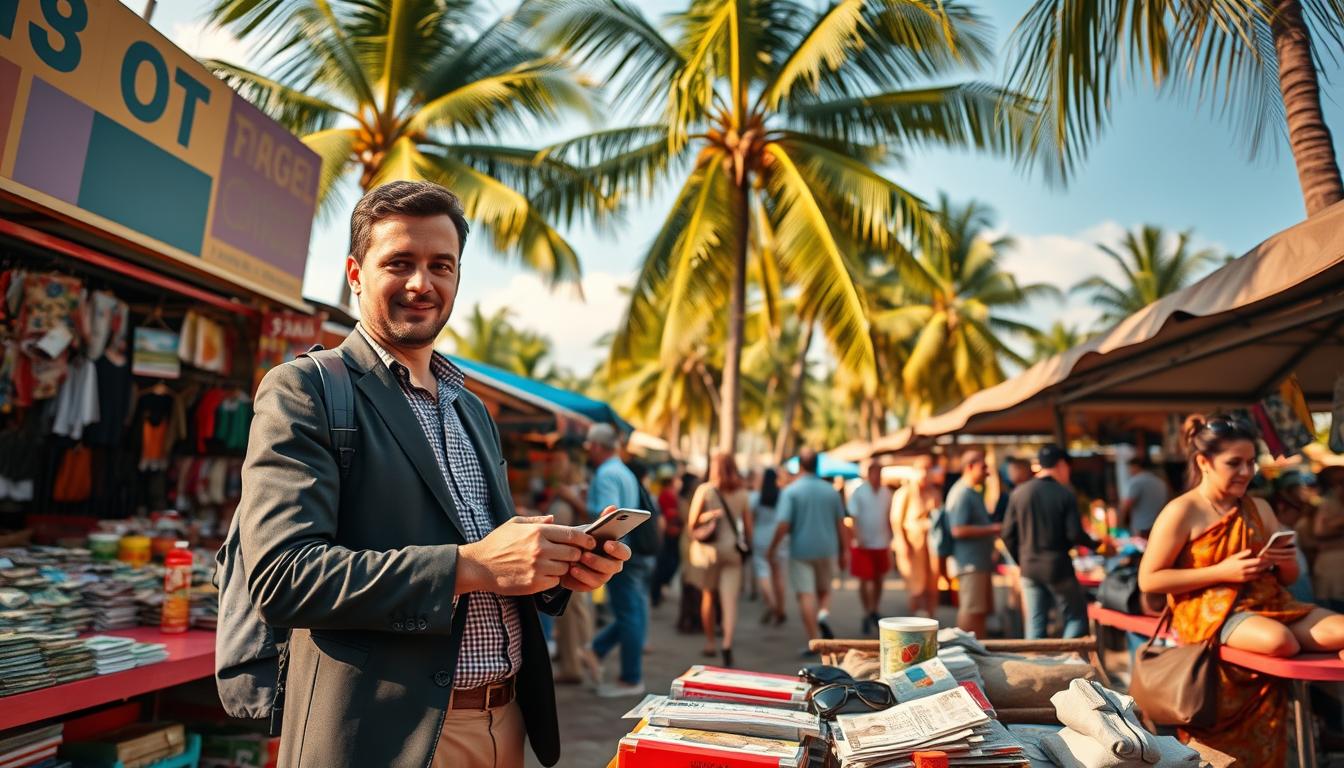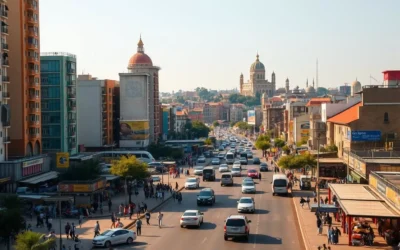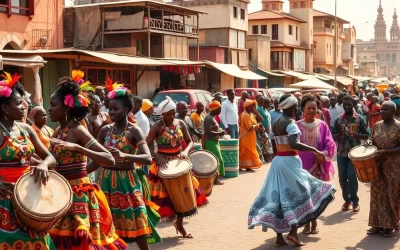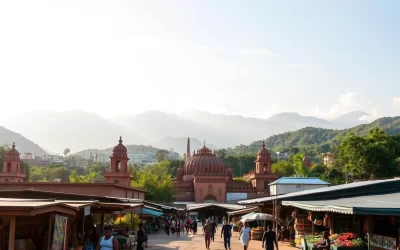✓ Accommodations✓ Flights✓ Rental Cars
Did you know that over 40 languages are spoken in Guinea, making it one of the most linguistically diverse countries in Africa? While this West African gem is not yet a mainstream tourist destination, its rich culture and stunning landscapes make it a must-visit for adventurous travelers. However, navigating the local currency and payment methods can be tricky without the right guidance.
Whether you’re planning to explore bustling markets in Conakry or hike the scenic Mt. Nimba, understanding how to manage your money is essential. From using cards with low transaction fees to carrying cash for smaller vendors, this guide will help you make the most of your trip. You’ll also learn about the Wise Multi-Currency Card, a convenient option for competitive exchange rates and minimal fees.
By the end of this guide, you’ll feel confident handling payments, avoiding unnecessary charges, and focusing on the incredible experiences this unique country has to offer. Let’s get started!
Introduction: What to Expect on Your Trip to Guinea
Your trip to Guinea will be filled with unique experiences and discoveries. From vibrant markets in Conakry to the stunning peaks of Mt. Nimba, this country offers a mix of culture and nature that’s hard to match. Whether you’re exploring bustling streets or hiking through lush landscapes, every moment promises something special.
When it comes to practicalities, planning ahead is key. Local transportation often involves shared taxis, and understanding basic etiquette can go a long way. For example, a friendly greeting in French or a local language can make interactions smoother.
Managing your money is another important aspect. While some places accept cards, many smaller vendors prefer cash. ATMs are available in Conakry, but they may dispense limited amounts and charge fees. That’s why it’s smart to carry a mix of payment methods.
“Traveling is not just about the destination; it’s about how you navigate the journey.”
In this guide, you’ll learn about the local currency, the best card options, and tips for using ATMs. We’ll also explore the Wise Multi-Currency Card, a convenient choice for competitive exchange rates and low transaction fees.
Here’s a quick overview of what to expect:
| Aspect | Details |
|---|---|
| Currency | Guinean Franc (GNF) |
| Payment Methods | Cash, Cards, Mobile Wallets |
| ATM Availability | Limited in Conakry |
| Exchange Tips | Avoid airport exchanges for better rates |
By the end of this guide, you’ll have all the tools to manage your money wisely and focus on enjoying your trip. Let’s dive in and make your adventure unforgettable!
Understanding the Guinean Currency Landscape
The Guinean Franc (GNF) is the backbone of financial transactions in this vibrant West African nation. Introduced in 1985, it replaced the Syli and has since been the official currency. Knowing how to handle it is essential for a smooth trip.
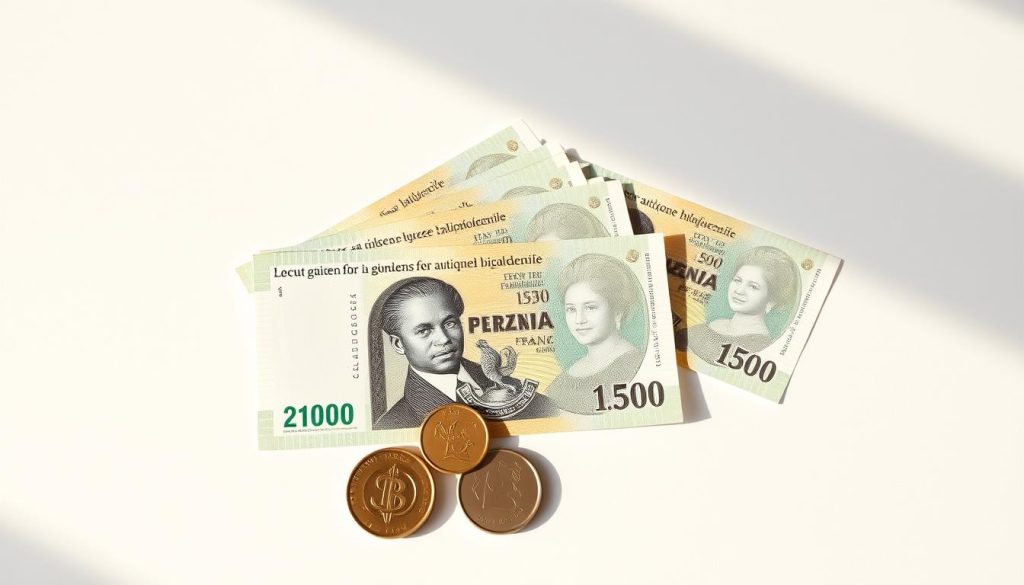
Banknotes come in denominations of FG500, 1,000, 2,000, 5,000, 10,000, and 20,000. Smaller bills are handy for everyday purchases, while larger ones are useful for bigger expenses. Always carry a mix of denominations to avoid issues with change.
Exchange rates can vary, so it’s wise to check the current rate before your travel. Avoid exchanging money at the airport, as rates are often less favorable. Instead, use local banks or authorized exchange services for better deals.
Here are some practical tips for handling cash:
- Carry small bills for markets and street vendors.
- Keep larger denominations for hotels or restaurants.
- Always count your change to ensure accuracy.
Using the local currency has its advantages. It’s widely accepted and helps you avoid extra fees from conversion. However, carrying too much cash can be risky. Balance is key.
Understanding the Guinean Franc and how to use it effectively will make your trip more enjoyable. With these tips, you’ll be ready to navigate the currency landscape like a pro.
Payment Options in Guinea
When planning your trip to this West African gem, understanding the payment options is crucial for a smooth experience. From bustling markets to upscale hotels, knowing how to pay can save you time and money. Here’s a detailed guide to help you navigate the local payment landscape.
Using Card and Cash Methods in Various Establishments
In larger cities like Conakry, cards are accepted at upscale hotels, restaurants, and some supermarkets. However, smaller shops and local markets often prefer cash. Carrying the local currency, the Guinean Franc, is essential for these transactions.
Here’s a quick breakdown of where you can use each payment method:
- Cards: Accepted at major hotels and tourist-friendly restaurants.
- Cash: Necessary for street vendors, local markets, and small businesses.
To avoid extra fees, always choose to pay in the local currency when using your card. This helps you get the best exchange rate and reduces transaction costs.
Navigating Local ATM Networks
ATMs are available in Conakry and other urban areas, but they can be limited in rural regions. Most ATMs dispense the local currency, but withdrawal limits and fees vary by bank. Here are some tips for using ATMs:
- Use ATMs located inside banks for added security.
- Check your bank’s international withdrawal fees in advance.
- Carry a mix of cash and cards to avoid relying solely on ATMs.
Blending card usage with carrying cash is the best way to ensure you’re prepared for any situation. This approach minimizes transaction fees and keeps you flexible.
| Payment Method | Best For |
|---|---|
| Cards | Hotels, restaurants, and larger stores |
| Cash | Markets, street vendors, and small shops |
| ATMs | Withdrawing local currency in urban areas |
By understanding these payment options, you can manage your money efficiently and focus on enjoying your trip. Always plan ahead and carry a mix of methods to stay prepared.
The Wise Multi-Currency Card Experience
Managing your money abroad doesn’t have to be complicated with the right tools. The Wise Multi-Currency Card is a popular option for travelers seeking convenience and cost-effectiveness. Whether you’re exploring bustling cities or remote areas, this card simplifies payments and minimizes fees.
How to Order and Activate Your Card
Ordering the Wise Multi-Currency Card is straightforward. Start by downloading the app or visiting the official website. Create an account, verify your identity, and follow the prompts to order your card. Once it arrives, activate it through the app or website by entering the required details.
Verification typically involves submitting a photo ID and proof of address. Shipping times vary, so it’s best to order in advance to ensure it arrives before your trip.
Competitive Exchange Rates and Fee Insights
One of the standout features of the Wise Multi-Currency Card is its use of mid-market exchange rates. This means you get the real rate without hidden markups. Compared to traditional banks, this can save you a lot on conversion costs.
The card also offers free monthly ATM withdrawals up to a certain limit, making it a cost-effective option for accessing cash. Beyond the limit, a small fee applies, but it’s still lower than most alternatives.
Here’s a quick comparison of its benefits:
- No hidden transaction fees.
- Supports multiple currencies for seamless payments.
- Transparent fee structure with real-time updates.
With the Wise Multi-Currency Card, you can focus on enjoying your trip without worrying about unnecessary costs. It’s a smart way to manage your money while exploring new destinations.
Guinea: Ultimate Travelers Guide to Currencies & Payments
Exploring a new country is always exciting, but managing your money wisely can make the experience even better. This guide has walked you through the essentials of handling currency, choosing the right payment methods, and minimizing unnecessary fees during your trip.
Here’s a quick recap of what you’ve learned:
- The Guinean Franc is the local currency, and carrying a mix of small and large bills is essential for smooth transactions.
- While cards are accepted in urban areas, cash remains the preferred payment method in smaller towns and markets.
- ATMs are available in cities like Conakry, but they often have withdrawal limits and charge fees.
One standout option is the Wise Multi-Currency Card. It offers competitive exchange rates, low transaction fees, and the convenience of managing multiple currencies in one place. This tool can save you time and money, allowing you to focus on enjoying your travel.
To make the most of your trip, review all sections of this guide. From understanding the currency landscape to navigating ATM networks, each part provides valuable insights to help you stay prepared.
“Smart financial planning is the key to a stress-free journey.”
Here’s a summary of the main payment methods and their uses:
| Method | Best For |
|---|---|
| Cards | Hotels, restaurants, and larger stores |
| Cash | Markets, street vendors, and small shops |
| ATMs | Withdrawing local currency in urban areas |
By following these tips and using tools like the Wise Multi-Currency Card, you’ll be ready to handle your money with confidence. Enjoy your adventure and make unforgettable memories!
Comparing the Best Travel Money Cards for Guinea
Choosing the right travel money card can make or break your international trip. With so many options available, it’s essential to compare features, fees, and benefits to find the best fit for your needs. Here’s a detailed look at four popular cards: Wise, Chime, Monzo, and Netspend.
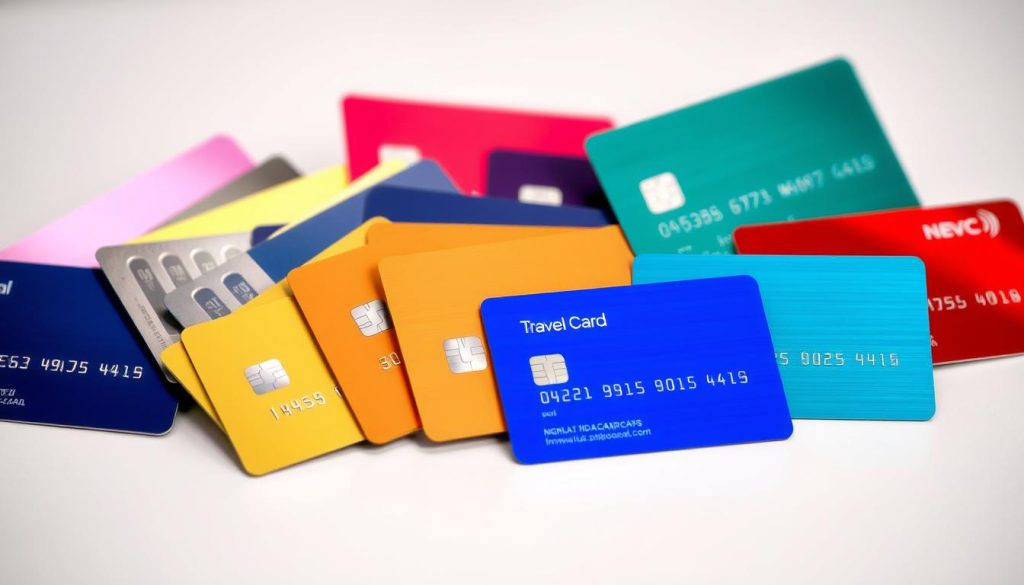
Feature and Fee Comparison Overview
Each card offers unique features tailored to travelers. Wise is known for its competitive exchange rates and low transaction fees. Chime stands out with no foreign transaction fees and free ATM withdrawals. Monzo provides real-time spending notifications and budgeting tools, while Netspend offers prepaid options with no credit check.
Here’s a quick comparison of their key features:
- Wise: Supports multiple currencies, mid-market exchange rates, and low fees.
- Chime: No foreign transaction fees, free ATM withdrawals, and early direct deposit.
- Monzo: Budgeting tools, real-time notifications, and no fees for spending abroad.
- Netspend: Prepaid card, no credit check, and customizable reload options.
Pros and Cons of Top Card Choices
Every card has its strengths and weaknesses. Wise is excellent for frequent travelers but charges a small fee for ATM withdrawals beyond the monthly limit. Chime is ideal for those who prefer fee-free ATM access but lacks multi-currency support. Monzo is great for budget-conscious travelers but isn’t widely accepted in rural areas. Netspend offers flexibility but comes with higher costs for certain services.
Here’s a breakdown of their pros and cons:
| Card | Pros | Cons |
|---|---|---|
| Wise | Low fees, multi-currency support | Limited free ATM withdrawals |
| Chime | No foreign transaction fees, free ATM access | No multi-currency support |
| Monzo | Budgeting tools, no spending fees | Limited acceptance in rural areas |
| Netspend | Prepaid flexibility, no credit check | Higher costs for some services |
By understanding these features and trade-offs, you can select the card that best suits your travel style. Whether you prioritize low fees, multi-currency support, or budgeting tools, there’s an option for everyone.
How to Manage ATM Withdrawals and Minimize Fees
Navigating ATM withdrawals abroad can save you money if done right. Understanding how to use ATMs efficiently ensures you avoid unnecessary fees and keep more cash for your travel adventures. Here’s how to make the most of your withdrawals while staying cost-effective.
Smart Withdrawal Strategies
One of the best ways to minimize fees is to make fewer, larger withdrawals. This reduces the number of transactions and associated costs. Always choose ATMs affiliated with major banks, as they often have lower fees compared to independent operators.
Here are some practical tips:
- Withdraw enough cash for a few days to avoid frequent trips to the ATM.
- Use ATMs located inside banks for added security and lower fees.
- Check your bank’s international withdrawal policies to understand potential charges.
Paying in the local currency is another smart move. It helps you avoid dynamic currency conversion (DCC) fees, which can add up quickly.
Avoiding Hidden ATM Charges
Hidden fees can catch you off guard if you’re not careful. Independent ATMs often charge higher transaction fees, and some may even add service charges. Always read the on-screen prompts before completing a withdrawal.
Here’s how to stay ahead:
- Check the exchange rate before withdrawing to ensure you’re getting a fair deal.
- Use apps or online tools to find low-fee ATMs in your area.
- Notify your bank of your travel dates to prevent your card from being flagged for suspicious activity.
Planning ahead can make a big difference. Here’s a quick comparison of common ATM fees:
| ATM Type | Typical Fee |
|---|---|
| Bank ATMs | $2-$3 per transaction |
| Independent ATMs | $4-$5 per transaction |
| Airport ATMs | Higher fees, less favorable rates |
By following these strategies, you can manage your money wisely and focus on enjoying your trip. A little planning goes a long way in keeping your travel budget intact.
Mobile Wallets and Digital Payment Innovations in Guinea
Mobile wallets are revolutionizing how payments are made in this vibrant country. With the rise of digital systems, travelers can now enjoy faster, safer, and more convenient transactions. These innovations are particularly helpful in urban areas like Conakry, where modern establishments are embracing contactless payments.
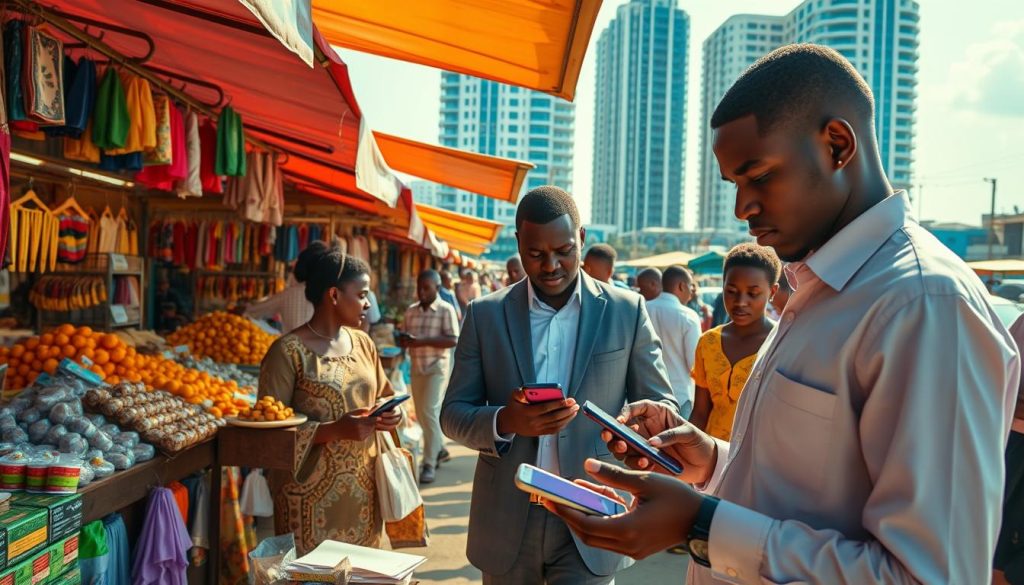
One of the key benefits of mobile wallets is enhanced security. Features like biometric authentication and encryption protect your money from fraud. Additionally, apps like Apple Pay and Google Wallet integrate seamlessly with international cards, making it easy to manage your funds abroad.
Digital payments also reduce transaction fees and streamline spending. For example, some apps offer competitive exchange rates, saving you money on conversions. This is especially useful for travelers who want to avoid high fees at ATMs or currency exchange counters.
Here’s how mobile wallets can enhance your travel experience:
- Quick and secure payments at restaurants, hotels, and shops.
- Integration with international cards for seamless transactions.
- Reduced fees and better exchange rates compared to traditional methods.
While cash is still essential in rural areas, digital payments are becoming increasingly popular in cities. Combining both methods ensures you’re prepared for any situation. Whether you’re buying souvenirs or paying for a meal, mobile wallets offer a modern, efficient way to handle your money.
Exploring these innovations can make your travel smoother and more enjoyable. By leveraging digital tools, you can focus on the experiences that matter most. So, why not give mobile wallets a try on your next trip?
Currency Exchange Strategies for Savvy Travelers
Getting the best exchange rates while traveling can save you a lot of money. Airport exchange counters are convenient but often come with poor rates and high fees. To avoid these pitfalls, it’s essential to plan ahead and explore smarter options.
Why Airport Exchanges Are Costly
Airport exchange services are notorious for offering less competitive rates. They often add hidden fees and markups, making them one of the most expensive ways to convert your money. Instead, consider using local banks or authorized exchange services for better deals.
Timing Your Currency Exchanges
Exchange rates fluctuate daily, so timing is key. Monitor the rate trends using financial apps or websites. Exchanging your money when the rate is favorable can save you significantly. Avoid last-minute exchanges, especially at airports.
Using Travel Cards for Better Rates
Travel cards like the Wise Multi-Currency Card offer mid-market exchange rates and low transaction fees. These cards allow you to lock in rates ahead of time, ensuring you get the best value for your money. They’re also widely accepted, making them a convenient option.
Monitoring Exchange Rate Fluctuations
Stay updated on exchange rate changes using apps like XE or Revolut. These tools provide real-time updates and alerts, helping you make informed decisions. Planning your exchanges around favorable rates can maximize your savings.
Developing a Robust Exchange Plan
Create a plan for exchanging your money before and during your travel. Use a mix of cash, cards, and digital payment methods to stay flexible. Avoid relying solely on one method to minimize risks and fees.
“Smart planning and the right tools can turn currency exchange from a hassle into a savings opportunity.”
By following these strategies, you can secure the best exchange rates and avoid unnecessary fees. Whether you’re using a card, withdrawing cash from an ATM, or exchanging money at a bank, a little preparation goes a long way.
Preparing Your Money for Guinea: Budgeting and Security
Planning your finances before traveling ensures a stress-free and enjoyable experience. Whether you’re exploring bustling markets or remote villages, having a clear budget and secure practices in place can make all the difference. Let’s dive into how you can manage your money wisely while staying safe.
Setting a Realistic Travel Budget
Start by estimating your daily expenses, including accommodation, meals, transportation, and activities. For budget-conscious travelers, $25–$45 per day is a good starting point. Mid-range travelers might spend $50–$100 daily, while luxury travelers could exceed $150. Always factor in extra cash for emergencies or unexpected costs.
Break down your budget into categories to track spending easily. Use apps or spreadsheets to monitor your expenses in real-time. This helps you stay on track and avoid overspending.
Secure Practices for Managing Funds Abroad
Protecting your money is just as important as budgeting it. Use a card not linked to your main account for added security. This minimizes risks if your card is lost or stolen. Additionally, diversify your payment methods—carry a mix of cash, cards, and mobile wallets to avoid total loss if one method fails.
Know your card’s security features, such as instant freeze/unfreeze options through an app. This allows you to quickly block unauthorized transactions. Regularly monitor your accounts for any suspicious activity.
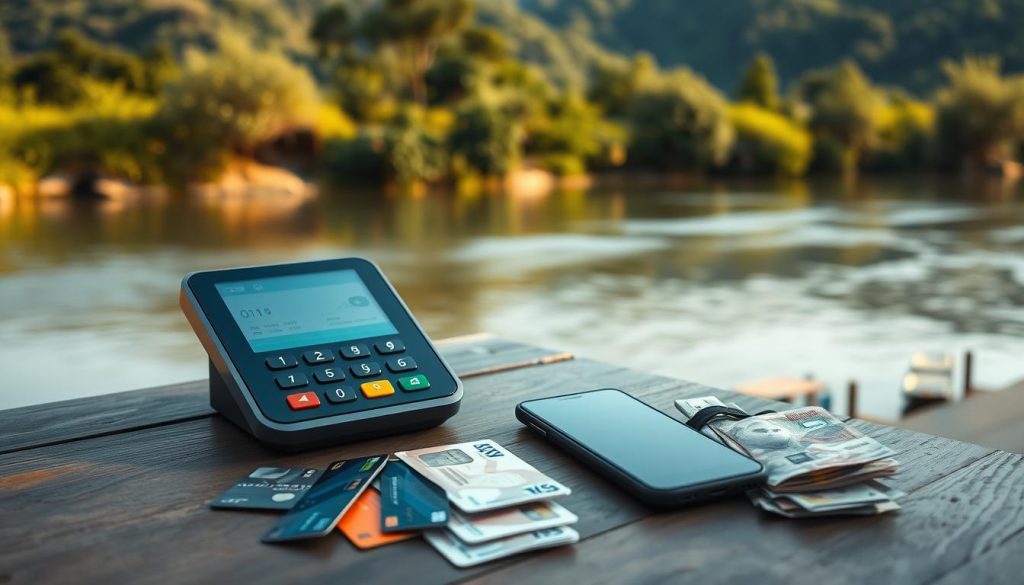
Pre-plan your expenses and keep a record of all transactions. This not only helps with budgeting but also ensures you’re aware of any unauthorized charges. By following these tips, you can focus on enjoying your trip without worrying about your finances.
“A well-planned budget and secure practices are the foundation of a worry-free journey.”
Insider Tips for a Smooth Payment Experience in Guinea
To make your trip hassle-free, mastering the local payment methods is essential. Here are some insider tips to help you navigate currency, avoid common pitfalls, and ensure a seamless experience.
First, always carry a mix of cash and cards. While cards are accepted in urban areas like Conakry, smaller vendors and rural regions often prefer cash. This flexibility ensures you’re prepared for any situation.
When using ATMs, stick to those inside banks for added security. Be aware of withdrawal limits and fees, which can vary. Withdraw larger amounts less frequently to minimize transaction costs.
If your card is declined or lost, act quickly. Contact your bank immediately to block unauthorized use. Carry a backup card or keep emergency cash in a separate location.
Here’s a quick checklist to stay prepared:
- Carry small bills for markets and street vendors.
- Use cards for hotels and upscale restaurants.
- Monitor exchange rates to get the best value for your money.
Finally, plan for unexpected expenses. Set aside a small budget for emergencies, and consider using a travel card with low fees and competitive exchange rates. This proactive approach ensures you’re ready for anything.
“Smart planning and flexibility are the keys to a stress-free payment experience.”
By following these tips, you’ll handle your money with confidence and focus on enjoying your travel. Whether you’re exploring bustling markets or remote villages, these strategies will make your trip smoother and more enjoyable.
Conclusion
Planning your finances for an international trip doesn’t have to be overwhelming. By understanding the local currency and payment methods, you can make confident financial decisions. Using a card like the Wise Multi-Currency Card offers competitive exchange rates and low fees, making it a smart choice for travelers.
When using ATMs, withdraw larger amounts less frequently to minimize transaction costs. Always carry a mix of cash and cards to stay flexible. Avoid dynamic currency conversion to save on unnecessary fees.
Stay informed about exchange rates and plan ahead to get the best value for your money. Review your options and consult your bank for additional guidance. With these tips, you’ll handle your finances with ease and focus on enjoying your travel.
The above is subject to change.
Check back often to TRAVEL.COM for the latest travel tips and deals.
